Analyzing Social Work Theories and Ethics in Practice: Case Study
VerifiedAdded on 2023/06/12
|15
|4070
|133
Essay
AI Summary
This essay provides a comprehensive analysis of a case study involving an 82-year-old widowed man with Alzheimer's disease, applying key social work theories and ethical principles. It delves into the application of psychodynamic theory and the socio-ecological model to understand the client's situation, highlighting the importance of considering the individual within their environment. The essay examines the interplay between the individual's needs, family dynamics, and the broader healthcare system, addressing issues such as the client's resistance to care, hospital readmissions, and the ethical dilemmas faced by social workers. It further explores the purpose of social work in promoting well-being and the strengths and limitations of different theoretical standpoints in addressing complex social issues. Desklib offers a platform to access this document along with many other solved assignments and past papers.
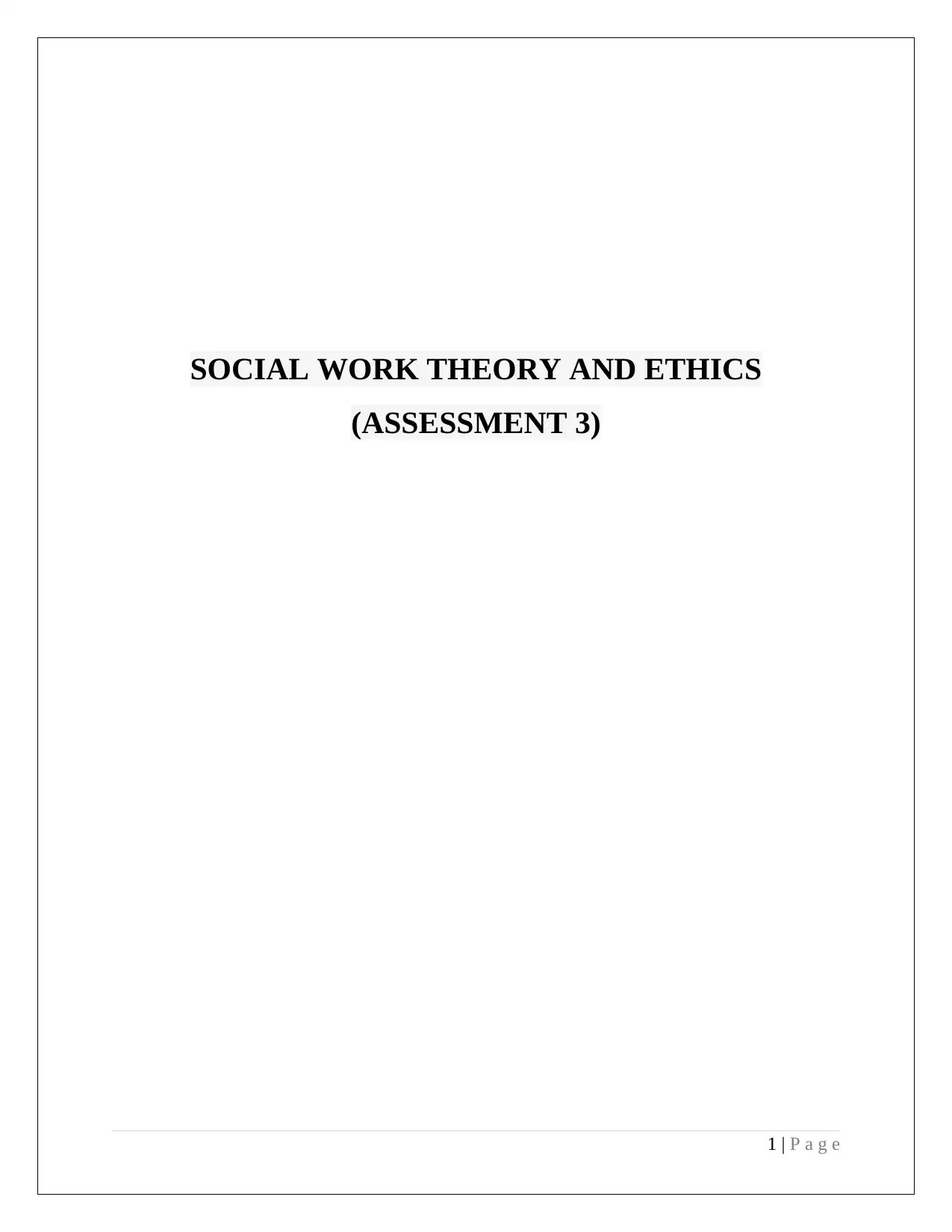
SOCIAL WORK THEORY AND ETHICS
(ASSESSMENT 3)
1 | P a g e
(ASSESSMENT 3)
1 | P a g e
Paraphrase This Document
Need a fresh take? Get an instant paraphrase of this document with our AI Paraphraser
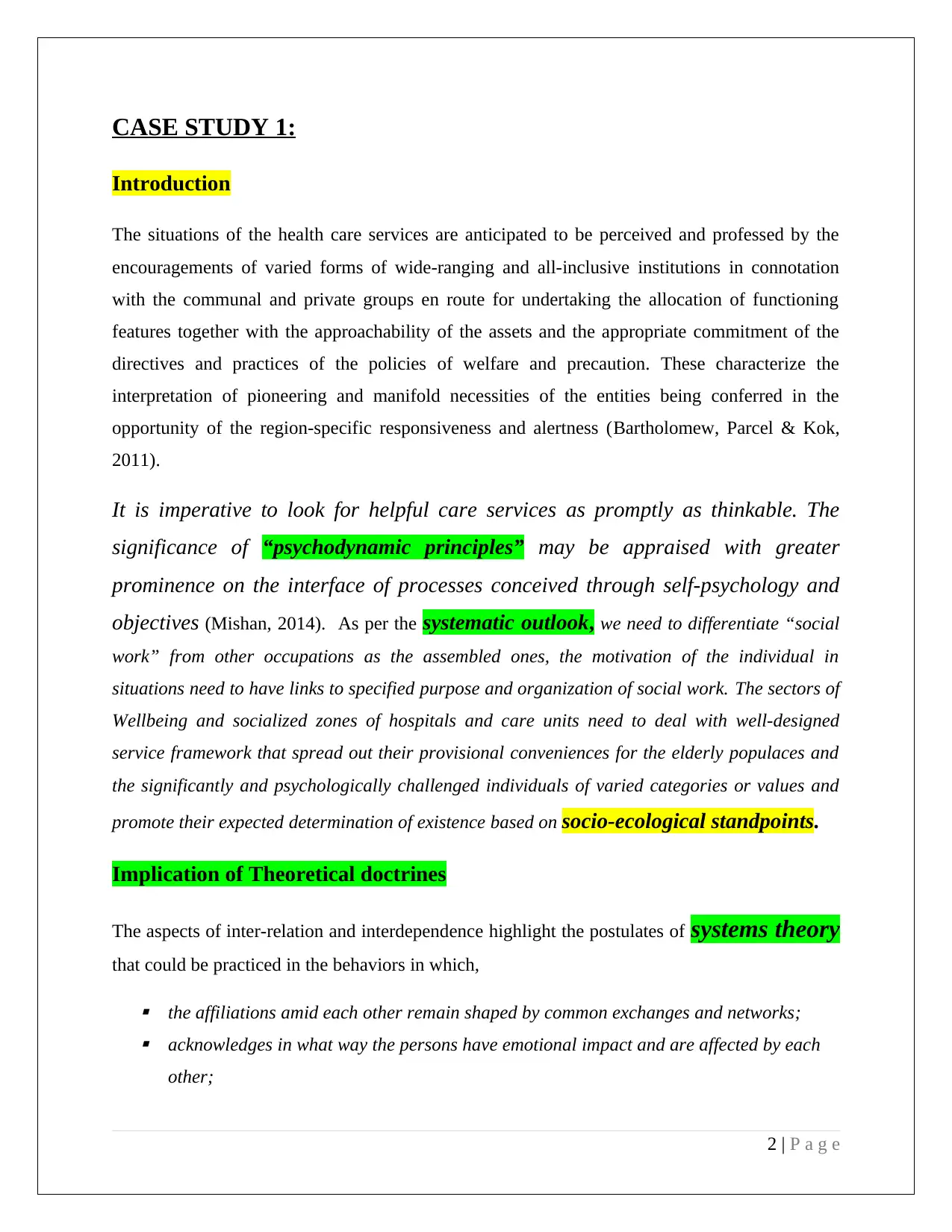
CASE STUDY 1:
Introduction
The situations of the health care services are anticipated to be perceived and professed by the
encouragements of varied forms of wide-ranging and all-inclusive institutions in connotation
with the communal and private groups en route for undertaking the allocation of functioning
features together with the approachability of the assets and the appropriate commitment of the
directives and practices of the policies of welfare and precaution. These characterize the
interpretation of pioneering and manifold necessities of the entities being conferred in the
opportunity of the region-specific responsiveness and alertness (Bartholomew, Parcel & Kok,
2011).
It is imperative to look for helpful care services as promptly as thinkable. The
significance of “psychodynamic principles” may be appraised with greater
prominence on the interface of processes conceived through self-psychology and
objectives (Mishan, 2014). As per the systematic outlook, we need to differentiate “social
work” from other occupations as the assembled ones, the motivation of the individual in
situations need to have links to specified purpose and organization of social work. The sectors of
Wellbeing and socialized zones of hospitals and care units need to deal with well-designed
service framework that spread out their provisional conveniences for the elderly populaces and
the significantly and psychologically challenged individuals of varied categories or values and
promote their expected determination of existence based on socio-ecological standpoints.
Implication of Theoretical doctrines
The aspects of inter-relation and interdependence highlight the postulates of systems theory
that could be practiced in the behaviors in which,
the affiliations amid each other remain shaped by common exchanges and networks; acknowledges in what way the persons have emotional impact and are affected by each
other;
2 | P a g e
Introduction
The situations of the health care services are anticipated to be perceived and professed by the
encouragements of varied forms of wide-ranging and all-inclusive institutions in connotation
with the communal and private groups en route for undertaking the allocation of functioning
features together with the approachability of the assets and the appropriate commitment of the
directives and practices of the policies of welfare and precaution. These characterize the
interpretation of pioneering and manifold necessities of the entities being conferred in the
opportunity of the region-specific responsiveness and alertness (Bartholomew, Parcel & Kok,
2011).
It is imperative to look for helpful care services as promptly as thinkable. The
significance of “psychodynamic principles” may be appraised with greater
prominence on the interface of processes conceived through self-psychology and
objectives (Mishan, 2014). As per the systematic outlook, we need to differentiate “social
work” from other occupations as the assembled ones, the motivation of the individual in
situations need to have links to specified purpose and organization of social work. The sectors of
Wellbeing and socialized zones of hospitals and care units need to deal with well-designed
service framework that spread out their provisional conveniences for the elderly populaces and
the significantly and psychologically challenged individuals of varied categories or values and
promote their expected determination of existence based on socio-ecological standpoints.
Implication of Theoretical doctrines
The aspects of inter-relation and interdependence highlight the postulates of systems theory
that could be practiced in the behaviors in which,
the affiliations amid each other remain shaped by common exchanges and networks; acknowledges in what way the persons have emotional impact and are affected by each
other;
2 | P a g e
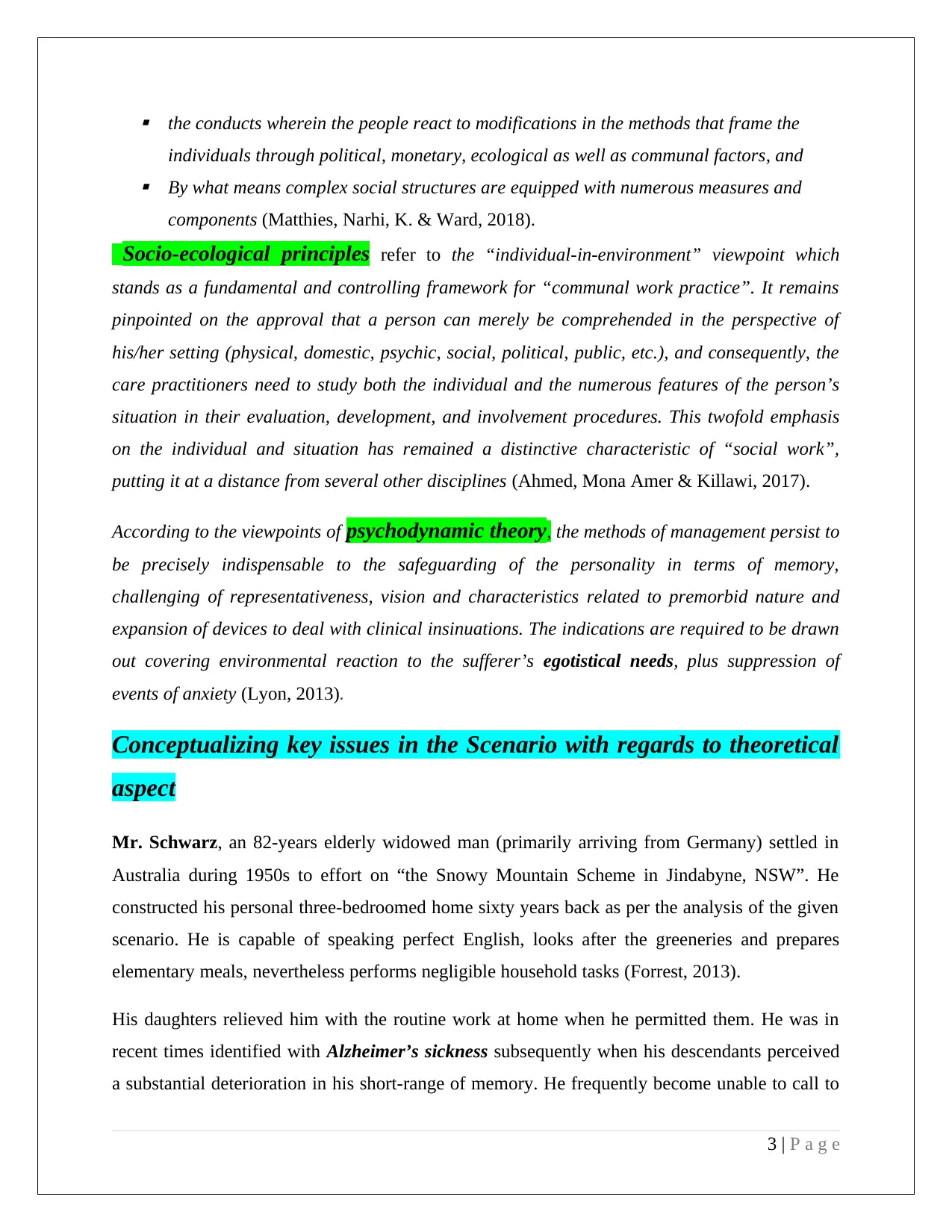
the conducts wherein the people react to modifications in the methods that frame the
individuals through political, monetary, ecological as well as communal factors, and By what means complex social structures are equipped with numerous measures and
components (Matthies, Narhi, K. & Ward, 2018).
Socio-ecological principles refer to the “individual-in-environment” viewpoint which
stands as a fundamental and controlling framework for “communal work practice”. It remains
pinpointed on the approval that a person can merely be comprehended in the perspective of
his/her setting (physical, domestic, psychic, social, political, public, etc.), and consequently, the
care practitioners need to study both the individual and the numerous features of the person’s
situation in their evaluation, development, and involvement procedures. This twofold emphasis
on the individual and situation has remained a distinctive characteristic of “social work”,
putting it at a distance from several other disciplines (Ahmed, Mona Amer & Killawi, 2017).
According to the viewpoints of psychodynamic theory, the methods of management persist to
be precisely indispensable to the safeguarding of the personality in terms of memory,
challenging of representativeness, vision and characteristics related to premorbid nature and
expansion of devices to deal with clinical insinuations. The indications are required to be drawn
out covering environmental reaction to the sufferer’s egotistical needs, plus suppression of
events of anxiety (Lyon, 2013).
Conceptualizing key issues in the Scenario with regards to theoretical
aspect
Mr. Schwarz, an 82-years elderly widowed man (primarily arriving from Germany) settled in
Australia during 1950s to effort on “the Snowy Mountain Scheme in Jindabyne, NSW”. He
constructed his personal three-bedroomed home sixty years back as per the analysis of the given
scenario. He is capable of speaking perfect English, looks after the greeneries and prepares
elementary meals, nevertheless performs negligible household tasks (Forrest, 2013).
His daughters relieved him with the routine work at home when he permitted them. He was in
recent times identified with Alzheimer’s sickness subsequently when his descendants perceived
a substantial deterioration in his short-range of memory. He frequently become unable to call to
3 | P a g e
individuals through political, monetary, ecological as well as communal factors, and By what means complex social structures are equipped with numerous measures and
components (Matthies, Narhi, K. & Ward, 2018).
Socio-ecological principles refer to the “individual-in-environment” viewpoint which
stands as a fundamental and controlling framework for “communal work practice”. It remains
pinpointed on the approval that a person can merely be comprehended in the perspective of
his/her setting (physical, domestic, psychic, social, political, public, etc.), and consequently, the
care practitioners need to study both the individual and the numerous features of the person’s
situation in their evaluation, development, and involvement procedures. This twofold emphasis
on the individual and situation has remained a distinctive characteristic of “social work”,
putting it at a distance from several other disciplines (Ahmed, Mona Amer & Killawi, 2017).
According to the viewpoints of psychodynamic theory, the methods of management persist to
be precisely indispensable to the safeguarding of the personality in terms of memory,
challenging of representativeness, vision and characteristics related to premorbid nature and
expansion of devices to deal with clinical insinuations. The indications are required to be drawn
out covering environmental reaction to the sufferer’s egotistical needs, plus suppression of
events of anxiety (Lyon, 2013).
Conceptualizing key issues in the Scenario with regards to theoretical
aspect
Mr. Schwarz, an 82-years elderly widowed man (primarily arriving from Germany) settled in
Australia during 1950s to effort on “the Snowy Mountain Scheme in Jindabyne, NSW”. He
constructed his personal three-bedroomed home sixty years back as per the analysis of the given
scenario. He is capable of speaking perfect English, looks after the greeneries and prepares
elementary meals, nevertheless performs negligible household tasks (Forrest, 2013).
His daughters relieved him with the routine work at home when he permitted them. He was in
recent times identified with Alzheimer’s sickness subsequently when his descendants perceived
a substantial deterioration in his short-range of memory. He frequently become unable to call to
3 | P a g e
⊘ This is a preview!⊘
Do you want full access?
Subscribe today to unlock all pages.

Trusted by 1+ million students worldwide
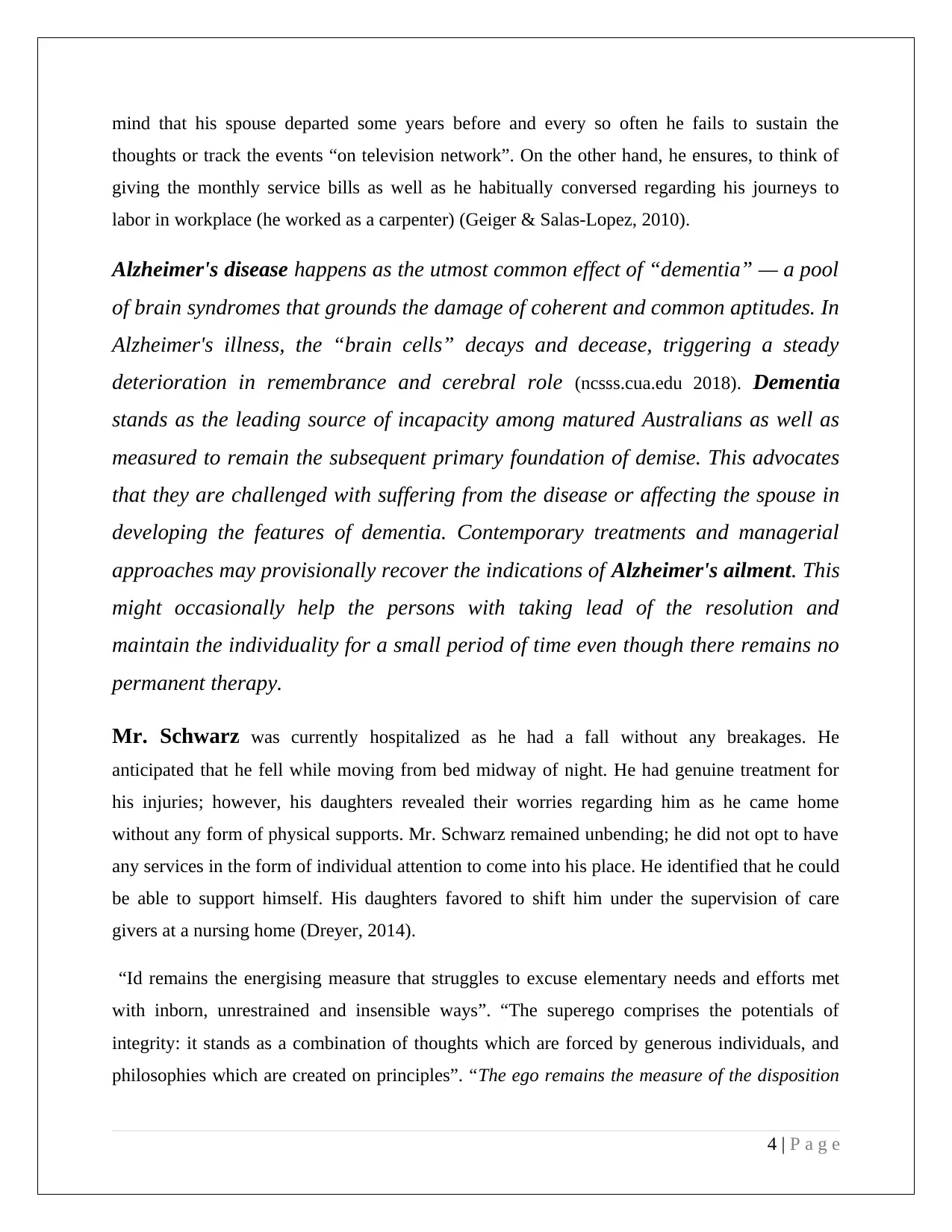
mind that his spouse departed some years before and every so often he fails to sustain the
thoughts or track the events “on television network”. On the other hand, he ensures, to think of
giving the monthly service bills as well as he habitually conversed regarding his journeys to
labor in workplace (he worked as a carpenter) (Geiger & Salas-Lopez, 2010).
Alzheimer's disease happens as the utmost common effect of “dementia” — a pool
of brain syndromes that grounds the damage of coherent and common aptitudes. In
Alzheimer's illness, the “brain cells” decays and decease, triggering a steady
deterioration in remembrance and cerebral role (ncsss.cua.edu 2018). Dementia
stands as the leading source of incapacity among matured Australians as well as
measured to remain the subsequent primary foundation of demise. This advocates
that they are challenged with suffering from the disease or affecting the spouse in
developing the features of dementia. Contemporary treatments and managerial
approaches may provisionally recover the indications of Alzheimer's ailment. This
might occasionally help the persons with taking lead of the resolution and
maintain the individuality for a small period of time even though there remains no
permanent therapy.
Mr. Schwarz was currently hospitalized as he had a fall without any breakages. He
anticipated that he fell while moving from bed midway of night. He had genuine treatment for
his injuries; however, his daughters revealed their worries regarding him as he came home
without any form of physical supports. Mr. Schwarz remained unbending; he did not opt to have
any services in the form of individual attention to come into his place. He identified that he could
be able to support himself. His daughters favored to shift him under the supervision of care
givers at a nursing home (Dreyer, 2014).
“Id remains the energising measure that struggles to excuse elementary needs and efforts met
with inborn, unrestrained and insensible ways”. “The superego comprises the potentials of
integrity: it stands as a combination of thoughts which are forced by generous individuals, and
philosophies which are created on principles”. “The ego remains the measure of the disposition
4 | P a g e
thoughts or track the events “on television network”. On the other hand, he ensures, to think of
giving the monthly service bills as well as he habitually conversed regarding his journeys to
labor in workplace (he worked as a carpenter) (Geiger & Salas-Lopez, 2010).
Alzheimer's disease happens as the utmost common effect of “dementia” — a pool
of brain syndromes that grounds the damage of coherent and common aptitudes. In
Alzheimer's illness, the “brain cells” decays and decease, triggering a steady
deterioration in remembrance and cerebral role (ncsss.cua.edu 2018). Dementia
stands as the leading source of incapacity among matured Australians as well as
measured to remain the subsequent primary foundation of demise. This advocates
that they are challenged with suffering from the disease or affecting the spouse in
developing the features of dementia. Contemporary treatments and managerial
approaches may provisionally recover the indications of Alzheimer's ailment. This
might occasionally help the persons with taking lead of the resolution and
maintain the individuality for a small period of time even though there remains no
permanent therapy.
Mr. Schwarz was currently hospitalized as he had a fall without any breakages. He
anticipated that he fell while moving from bed midway of night. He had genuine treatment for
his injuries; however, his daughters revealed their worries regarding him as he came home
without any form of physical supports. Mr. Schwarz remained unbending; he did not opt to have
any services in the form of individual attention to come into his place. He identified that he could
be able to support himself. His daughters favored to shift him under the supervision of care
givers at a nursing home (Dreyer, 2014).
“Id remains the energising measure that struggles to excuse elementary needs and efforts met
with inborn, unrestrained and insensible ways”. “The superego comprises the potentials of
integrity: it stands as a combination of thoughts which are forced by generous individuals, and
philosophies which are created on principles”. “The ego remains the measure of the disposition
4 | P a g e
Paraphrase This Document
Need a fresh take? Get an instant paraphrase of this document with our AI Paraphraser
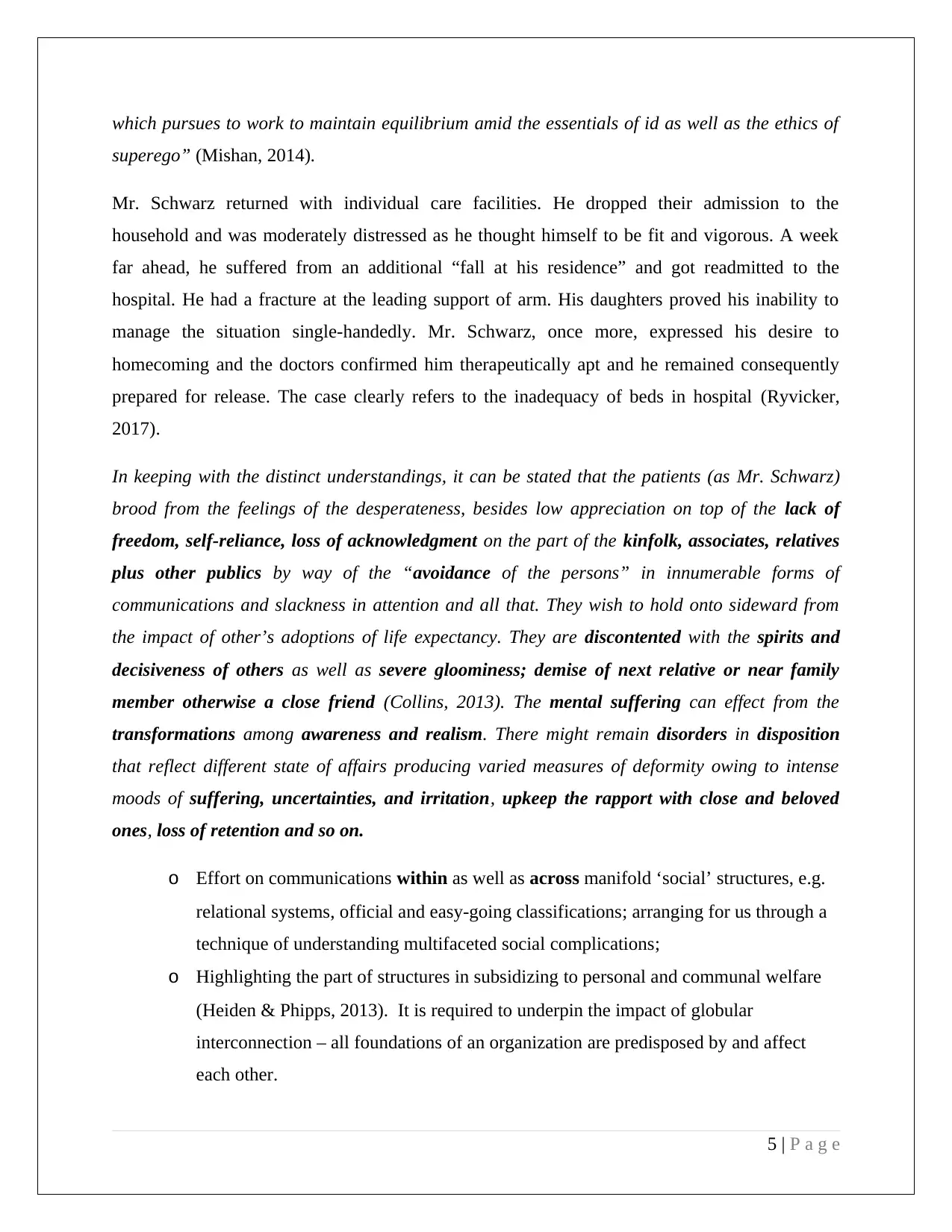
which pursues to work to maintain equilibrium amid the essentials of id as well as the ethics of
superego” (Mishan, 2014).
Mr. Schwarz returned with individual care facilities. He dropped their admission to the
household and was moderately distressed as he thought himself to be fit and vigorous. A week
far ahead, he suffered from an additional “fall at his residence” and got readmitted to the
hospital. He had a fracture at the leading support of arm. His daughters proved his inability to
manage the situation single-handedly. Mr. Schwarz, once more, expressed his desire to
homecoming and the doctors confirmed him therapeutically apt and he remained consequently
prepared for release. The case clearly refers to the inadequacy of beds in hospital (Ryvicker,
2017).
In keeping with the distinct understandings, it can be stated that the patients (as Mr. Schwarz)
brood from the feelings of the desperateness, besides low appreciation on top of the lack of
freedom, self-reliance, loss of acknowledgment on the part of the kinfolk, associates, relatives
plus other publics by way of the “avoidance of the persons” in innumerable forms of
communications and slackness in attention and all that. They wish to hold onto sideward from
the impact of other’s adoptions of life expectancy. They are discontented with the spirits and
decisiveness of others as well as severe gloominess; demise of next relative or near family
member otherwise a close friend (Collins, 2013). The mental suffering can effect from the
transformations among awareness and realism. There might remain disorders in disposition
that reflect different state of affairs producing varied measures of deformity owing to intense
moods of suffering, uncertainties, and irritation, upkeep the rapport with close and beloved
ones, loss of retention and so on.
o Effort on communications within as well as across manifold ‘social’ structures, e.g.
relational systems, official and easy-going classifications; arranging for us through a
technique of understanding multifaceted social complications;
o Highlighting the part of structures in subsidizing to personal and communal welfare
(Heiden & Phipps, 2013). It is required to underpin the impact of globular
interconnection – all foundations of an organization are predisposed by and affect
each other.
5 | P a g e
superego” (Mishan, 2014).
Mr. Schwarz returned with individual care facilities. He dropped their admission to the
household and was moderately distressed as he thought himself to be fit and vigorous. A week
far ahead, he suffered from an additional “fall at his residence” and got readmitted to the
hospital. He had a fracture at the leading support of arm. His daughters proved his inability to
manage the situation single-handedly. Mr. Schwarz, once more, expressed his desire to
homecoming and the doctors confirmed him therapeutically apt and he remained consequently
prepared for release. The case clearly refers to the inadequacy of beds in hospital (Ryvicker,
2017).
In keeping with the distinct understandings, it can be stated that the patients (as Mr. Schwarz)
brood from the feelings of the desperateness, besides low appreciation on top of the lack of
freedom, self-reliance, loss of acknowledgment on the part of the kinfolk, associates, relatives
plus other publics by way of the “avoidance of the persons” in innumerable forms of
communications and slackness in attention and all that. They wish to hold onto sideward from
the impact of other’s adoptions of life expectancy. They are discontented with the spirits and
decisiveness of others as well as severe gloominess; demise of next relative or near family
member otherwise a close friend (Collins, 2013). The mental suffering can effect from the
transformations among awareness and realism. There might remain disorders in disposition
that reflect different state of affairs producing varied measures of deformity owing to intense
moods of suffering, uncertainties, and irritation, upkeep the rapport with close and beloved
ones, loss of retention and so on.
o Effort on communications within as well as across manifold ‘social’ structures, e.g.
relational systems, official and easy-going classifications; arranging for us through a
technique of understanding multifaceted social complications;
o Highlighting the part of structures in subsidizing to personal and communal welfare
(Heiden & Phipps, 2013). It is required to underpin the impact of globular
interconnection – all foundations of an organization are predisposed by and affect
each other.
5 | P a g e
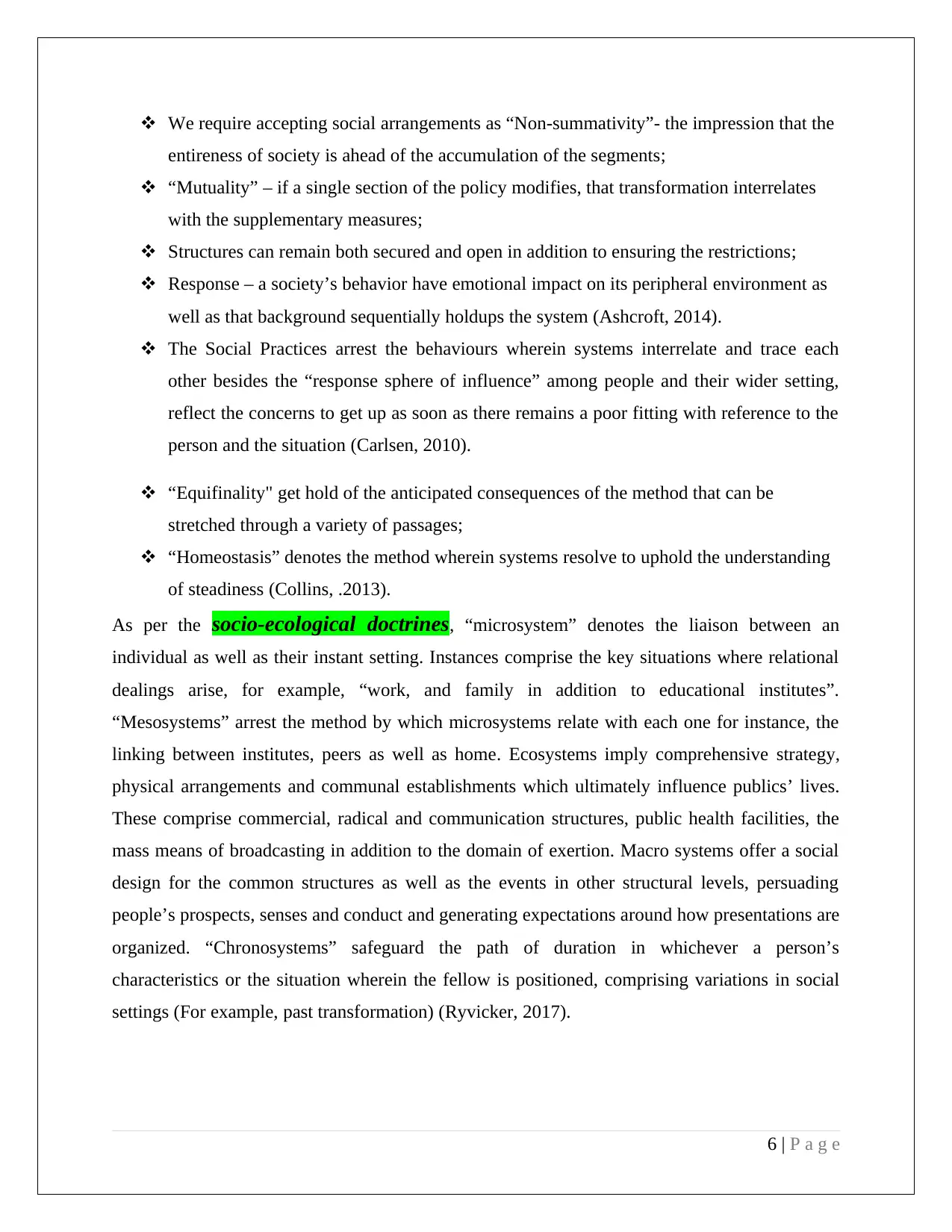
We require accepting social arrangements as “Non-summativity”- the impression that the
entireness of society is ahead of the accumulation of the segments;
“Mutuality” – if a single section of the policy modifies, that transformation interrelates
with the supplementary measures;
Structures can remain both secured and open in addition to ensuring the restrictions;
Response – a society’s behavior have emotional impact on its peripheral environment as
well as that background sequentially holdups the system (Ashcroft, 2014).
The Social Practices arrest the behaviours wherein systems interrelate and trace each
other besides the “response sphere of influence” among people and their wider setting,
reflect the concerns to get up as soon as there remains a poor fitting with reference to the
person and the situation (Carlsen, 2010).
“Equifinality" get hold of the anticipated consequences of the method that can be
stretched through a variety of passages;
“Homeostasis” denotes the method wherein systems resolve to uphold the understanding
of steadiness (Collins, .2013).
As per the socio-ecological doctrines, “microsystem” denotes the liaison between an
individual as well as their instant setting. Instances comprise the key situations where relational
dealings arise, for example, “work, and family in addition to educational institutes”.
“Mesosystems” arrest the method by which microsystems relate with each one for instance, the
linking between institutes, peers as well as home. Ecosystems imply comprehensive strategy,
physical arrangements and communal establishments which ultimately influence publics’ lives.
These comprise commercial, radical and communication structures, public health facilities, the
mass means of broadcasting in addition to the domain of exertion. Macro systems offer a social
design for the common structures as well as the events in other structural levels, persuading
people’s prospects, senses and conduct and generating expectations around how presentations are
organized. “Chronosystems” safeguard the path of duration in whichever a person’s
characteristics or the situation wherein the fellow is positioned, comprising variations in social
settings (For example, past transformation) (Ryvicker, 2017).
6 | P a g e
entireness of society is ahead of the accumulation of the segments;
“Mutuality” – if a single section of the policy modifies, that transformation interrelates
with the supplementary measures;
Structures can remain both secured and open in addition to ensuring the restrictions;
Response – a society’s behavior have emotional impact on its peripheral environment as
well as that background sequentially holdups the system (Ashcroft, 2014).
The Social Practices arrest the behaviours wherein systems interrelate and trace each
other besides the “response sphere of influence” among people and their wider setting,
reflect the concerns to get up as soon as there remains a poor fitting with reference to the
person and the situation (Carlsen, 2010).
“Equifinality" get hold of the anticipated consequences of the method that can be
stretched through a variety of passages;
“Homeostasis” denotes the method wherein systems resolve to uphold the understanding
of steadiness (Collins, .2013).
As per the socio-ecological doctrines, “microsystem” denotes the liaison between an
individual as well as their instant setting. Instances comprise the key situations where relational
dealings arise, for example, “work, and family in addition to educational institutes”.
“Mesosystems” arrest the method by which microsystems relate with each one for instance, the
linking between institutes, peers as well as home. Ecosystems imply comprehensive strategy,
physical arrangements and communal establishments which ultimately influence publics’ lives.
These comprise commercial, radical and communication structures, public health facilities, the
mass means of broadcasting in addition to the domain of exertion. Macro systems offer a social
design for the common structures as well as the events in other structural levels, persuading
people’s prospects, senses and conduct and generating expectations around how presentations are
organized. “Chronosystems” safeguard the path of duration in whichever a person’s
characteristics or the situation wherein the fellow is positioned, comprising variations in social
settings (For example, past transformation) (Ryvicker, 2017).
6 | P a g e
⊘ This is a preview!⊘
Do you want full access?
Subscribe today to unlock all pages.

Trusted by 1+ million students worldwide
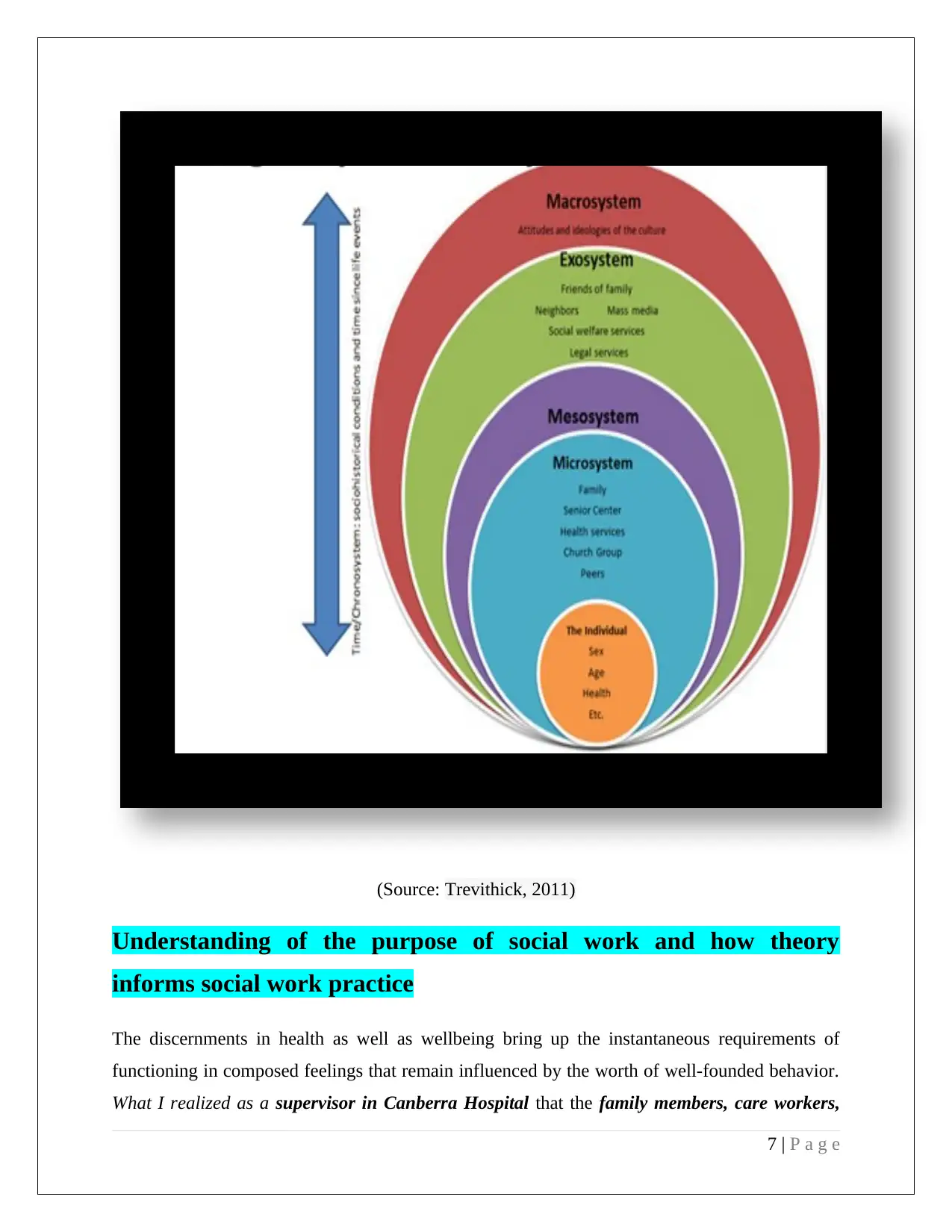
(Source: Trevithick, 2011)
Understanding of the purpose of social work and how theory
informs social work practice
The discernments in health as well as wellbeing bring up the instantaneous requirements of
functioning in composed feelings that remain influenced by the worth of well-founded behavior.
What I realized as a supervisor in Canberra Hospital that the family members, care workers,
7 | P a g e
Understanding of the purpose of social work and how theory
informs social work practice
The discernments in health as well as wellbeing bring up the instantaneous requirements of
functioning in composed feelings that remain influenced by the worth of well-founded behavior.
What I realized as a supervisor in Canberra Hospital that the family members, care workers,
7 | P a g e
Paraphrase This Document
Need a fresh take? Get an instant paraphrase of this document with our AI Paraphraser
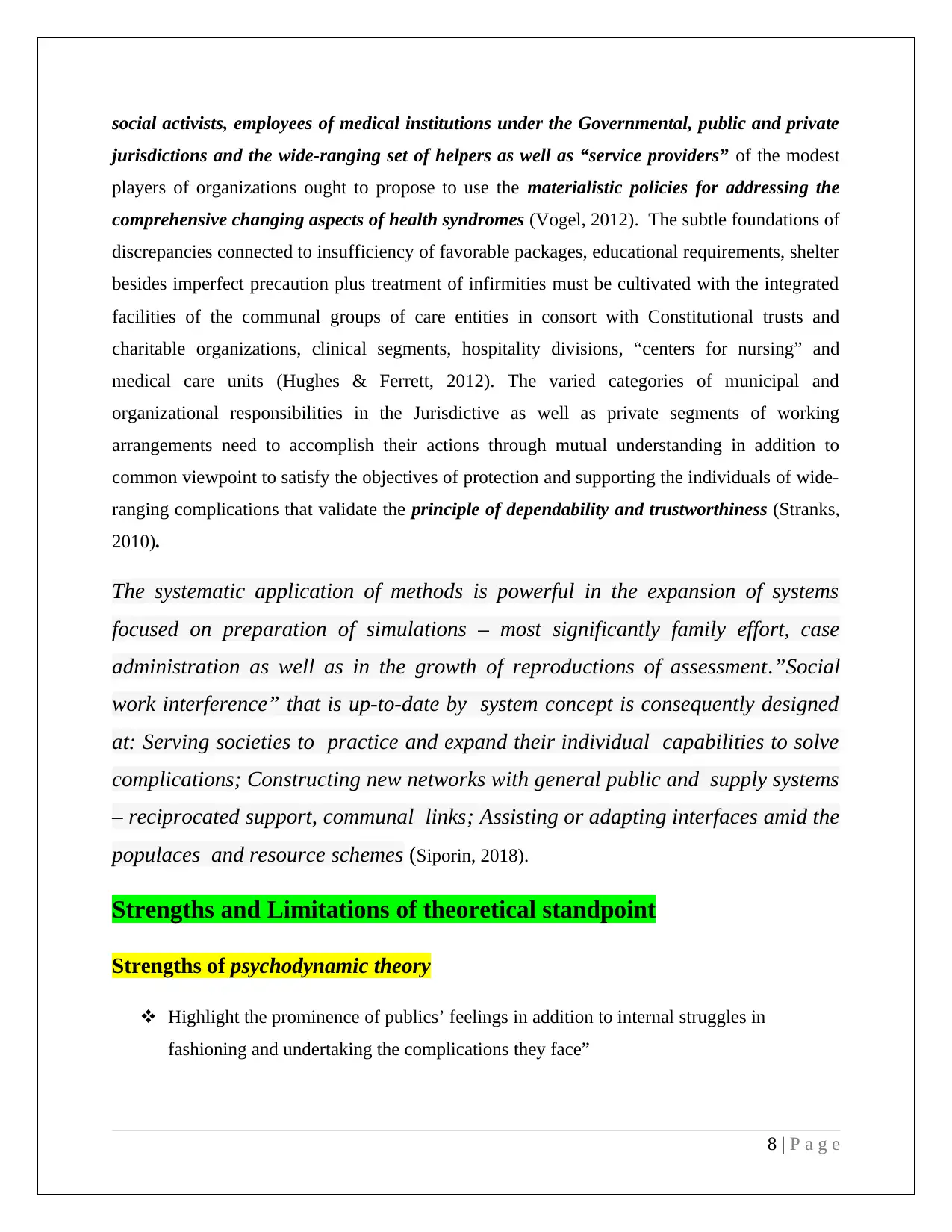
social activists, employees of medical institutions under the Governmental, public and private
jurisdictions and the wide-ranging set of helpers as well as “service providers” of the modest
players of organizations ought to propose to use the materialistic policies for addressing the
comprehensive changing aspects of health syndromes (Vogel, 2012). The subtle foundations of
discrepancies connected to insufficiency of favorable packages, educational requirements, shelter
besides imperfect precaution plus treatment of infirmities must be cultivated with the integrated
facilities of the communal groups of care entities in consort with Constitutional trusts and
charitable organizations, clinical segments, hospitality divisions, “centers for nursing” and
medical care units (Hughes & Ferrett, 2012). The varied categories of municipal and
organizational responsibilities in the Jurisdictive as well as private segments of working
arrangements need to accomplish their actions through mutual understanding in addition to
common viewpoint to satisfy the objectives of protection and supporting the individuals of wide-
ranging complications that validate the principle of dependability and trustworthiness (Stranks,
2010).
The systematic application of methods is powerful in the expansion of systems
focused on preparation of simulations – most significantly family effort, case
administration as well as in the growth of reproductions of assessment.”Social
work interference” that is up-to-date by system concept is consequently designed
at: Serving societies to practice and expand their individual capabilities to solve
complications; Constructing new networks with general public and supply systems
– reciprocated support, communal links; Assisting or adapting interfaces amid the
populaces and resource schemes (Siporin, 2018).
Strengths and Limitations of theoretical standpoint
Strengths of psychodynamic theory
Highlight the prominence of publics’ feelings in addition to internal struggles in
fashioning and undertaking the complications they face”
8 | P a g e
jurisdictions and the wide-ranging set of helpers as well as “service providers” of the modest
players of organizations ought to propose to use the materialistic policies for addressing the
comprehensive changing aspects of health syndromes (Vogel, 2012). The subtle foundations of
discrepancies connected to insufficiency of favorable packages, educational requirements, shelter
besides imperfect precaution plus treatment of infirmities must be cultivated with the integrated
facilities of the communal groups of care entities in consort with Constitutional trusts and
charitable organizations, clinical segments, hospitality divisions, “centers for nursing” and
medical care units (Hughes & Ferrett, 2012). The varied categories of municipal and
organizational responsibilities in the Jurisdictive as well as private segments of working
arrangements need to accomplish their actions through mutual understanding in addition to
common viewpoint to satisfy the objectives of protection and supporting the individuals of wide-
ranging complications that validate the principle of dependability and trustworthiness (Stranks,
2010).
The systematic application of methods is powerful in the expansion of systems
focused on preparation of simulations – most significantly family effort, case
administration as well as in the growth of reproductions of assessment.”Social
work interference” that is up-to-date by system concept is consequently designed
at: Serving societies to practice and expand their individual capabilities to solve
complications; Constructing new networks with general public and supply systems
– reciprocated support, communal links; Assisting or adapting interfaces amid the
populaces and resource schemes (Siporin, 2018).
Strengths and Limitations of theoretical standpoint
Strengths of psychodynamic theory
Highlight the prominence of publics’ feelings in addition to internal struggles in
fashioning and undertaking the complications they face”
8 | P a g e
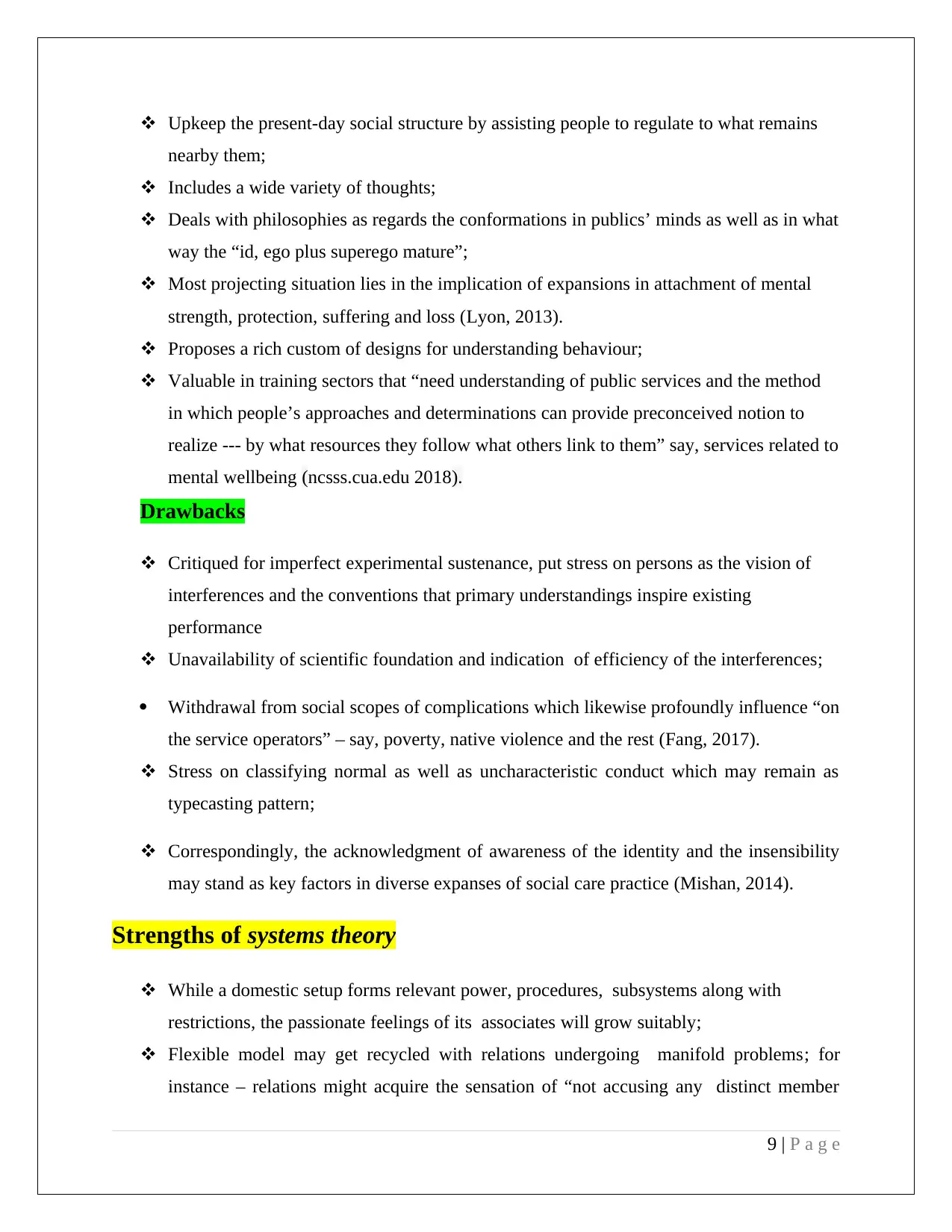
Upkeep the present-day social structure by assisting people to regulate to what remains
nearby them;
Includes a wide variety of thoughts;
Deals with philosophies as regards the conformations in publics’ minds as well as in what
way the “id, ego plus superego mature”;
Most projecting situation lies in the implication of expansions in attachment of mental
strength, protection, suffering and loss (Lyon, 2013).
Proposes a rich custom of designs for understanding behaviour;
Valuable in training sectors that “need understanding of public services and the method
in which people’s approaches and determinations can provide preconceived notion to
realize --- by what resources they follow what others link to them” say, services related to
mental wellbeing (ncsss.cua.edu 2018).
Drawbacks
Critiqued for imperfect experimental sustenance, put stress on persons as the vision of
interferences and the conventions that primary understandings inspire existing
performance
Unavailability of scientific foundation and indication of efficiency of the interferences;
Withdrawal from social scopes of complications which likewise profoundly influence “on
the service operators” – say, poverty, native violence and the rest (Fang, 2017).
Stress on classifying normal as well as uncharacteristic conduct which may remain as
typecasting pattern;
Correspondingly, the acknowledgment of awareness of the identity and the insensibility
may stand as key factors in diverse expanses of social care practice (Mishan, 2014).
Strengths of systems theory
While a domestic setup forms relevant power, procedures, subsystems along with
restrictions, the passionate feelings of its associates will grow suitably;
Flexible model may get recycled with relations undergoing manifold problems; for
instance – relations might acquire the sensation of “not accusing any distinct member
9 | P a g e
nearby them;
Includes a wide variety of thoughts;
Deals with philosophies as regards the conformations in publics’ minds as well as in what
way the “id, ego plus superego mature”;
Most projecting situation lies in the implication of expansions in attachment of mental
strength, protection, suffering and loss (Lyon, 2013).
Proposes a rich custom of designs for understanding behaviour;
Valuable in training sectors that “need understanding of public services and the method
in which people’s approaches and determinations can provide preconceived notion to
realize --- by what resources they follow what others link to them” say, services related to
mental wellbeing (ncsss.cua.edu 2018).
Drawbacks
Critiqued for imperfect experimental sustenance, put stress on persons as the vision of
interferences and the conventions that primary understandings inspire existing
performance
Unavailability of scientific foundation and indication of efficiency of the interferences;
Withdrawal from social scopes of complications which likewise profoundly influence “on
the service operators” – say, poverty, native violence and the rest (Fang, 2017).
Stress on classifying normal as well as uncharacteristic conduct which may remain as
typecasting pattern;
Correspondingly, the acknowledgment of awareness of the identity and the insensibility
may stand as key factors in diverse expanses of social care practice (Mishan, 2014).
Strengths of systems theory
While a domestic setup forms relevant power, procedures, subsystems along with
restrictions, the passionate feelings of its associates will grow suitably;
Flexible model may get recycled with relations undergoing manifold problems; for
instance – relations might acquire the sensation of “not accusing any distinct member
9 | P a g e
⊘ This is a preview!⊘
Do you want full access?
Subscribe today to unlock all pages.

Trusted by 1+ million students worldwide
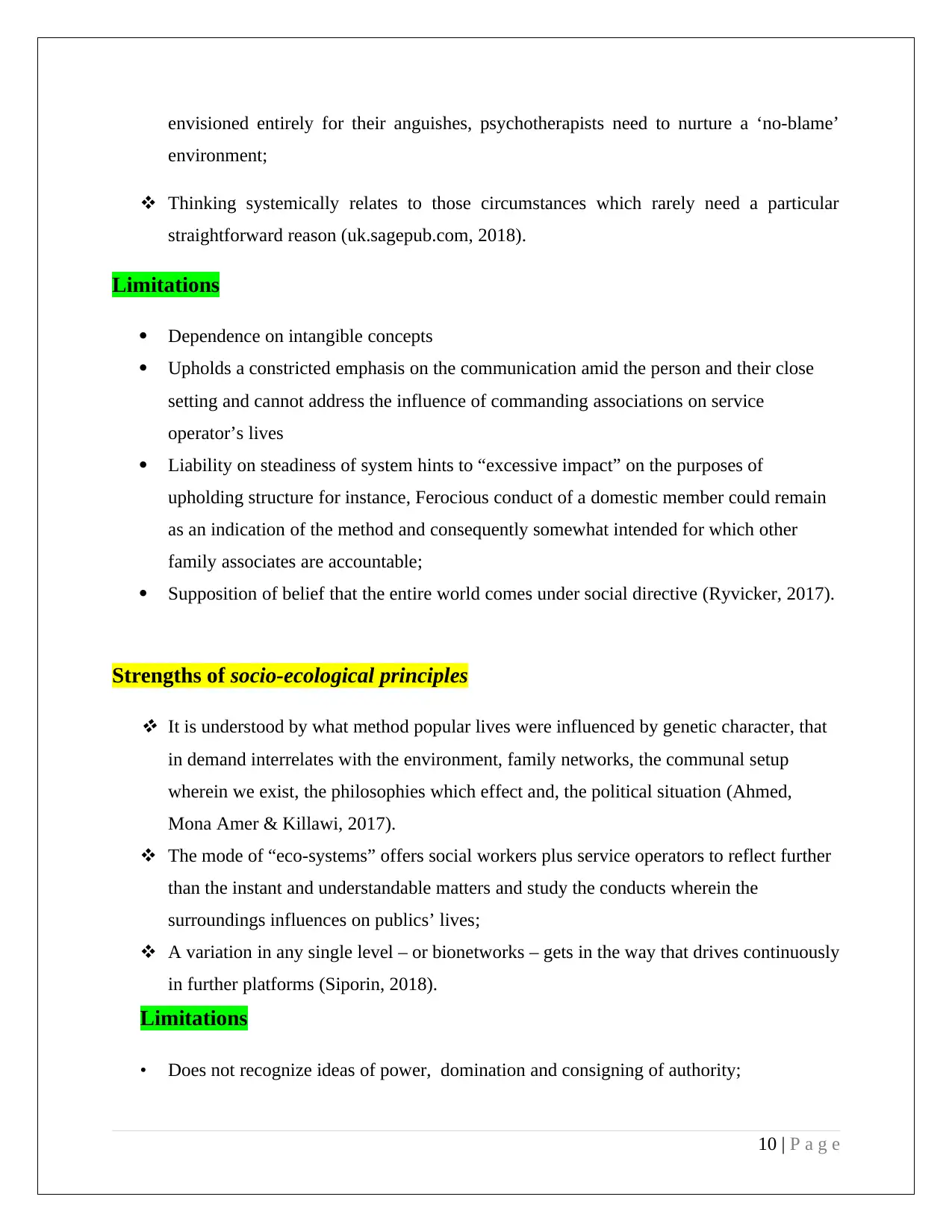
envisioned entirely for their anguishes, psychotherapists need to nurture a ‘no-blame’
environment;
Thinking systemically relates to those circumstances which rarely need a particular
straightforward reason (uk.sagepub.com, 2018).
Limitations
Dependence on intangible concepts
Upholds a constricted emphasis on the communication amid the person and their close
setting and cannot address the influence of commanding associations on service
operator’s lives
Liability on steadiness of system hints to “excessive impact” on the purposes of
upholding structure for instance, Ferocious conduct of a domestic member could remain
as an indication of the method and consequently somewhat intended for which other
family associates are accountable;
Supposition of belief that the entire world comes under social directive (Ryvicker, 2017).
Strengths of socio-ecological principles
It is understood by what method popular lives were influenced by genetic character, that
in demand interrelates with the environment, family networks, the communal setup
wherein we exist, the philosophies which effect and, the political situation (Ahmed,
Mona Amer & Killawi, 2017).
The mode of “eco-systems” offers social workers plus service operators to reflect further
than the instant and understandable matters and study the conducts wherein the
surroundings influences on publics’ lives;
A variation in any single level – or bionetworks – gets in the way that drives continuously
in further platforms (Siporin, 2018).
Limitations
• Does not recognize ideas of power, domination and consigning of authority;
10 | P a g e
environment;
Thinking systemically relates to those circumstances which rarely need a particular
straightforward reason (uk.sagepub.com, 2018).
Limitations
Dependence on intangible concepts
Upholds a constricted emphasis on the communication amid the person and their close
setting and cannot address the influence of commanding associations on service
operator’s lives
Liability on steadiness of system hints to “excessive impact” on the purposes of
upholding structure for instance, Ferocious conduct of a domestic member could remain
as an indication of the method and consequently somewhat intended for which other
family associates are accountable;
Supposition of belief that the entire world comes under social directive (Ryvicker, 2017).
Strengths of socio-ecological principles
It is understood by what method popular lives were influenced by genetic character, that
in demand interrelates with the environment, family networks, the communal setup
wherein we exist, the philosophies which effect and, the political situation (Ahmed,
Mona Amer & Killawi, 2017).
The mode of “eco-systems” offers social workers plus service operators to reflect further
than the instant and understandable matters and study the conducts wherein the
surroundings influences on publics’ lives;
A variation in any single level – or bionetworks – gets in the way that drives continuously
in further platforms (Siporin, 2018).
Limitations
• Does not recognize ideas of power, domination and consigning of authority;
10 | P a g e
Paraphrase This Document
Need a fresh take? Get an instant paraphrase of this document with our AI Paraphraser
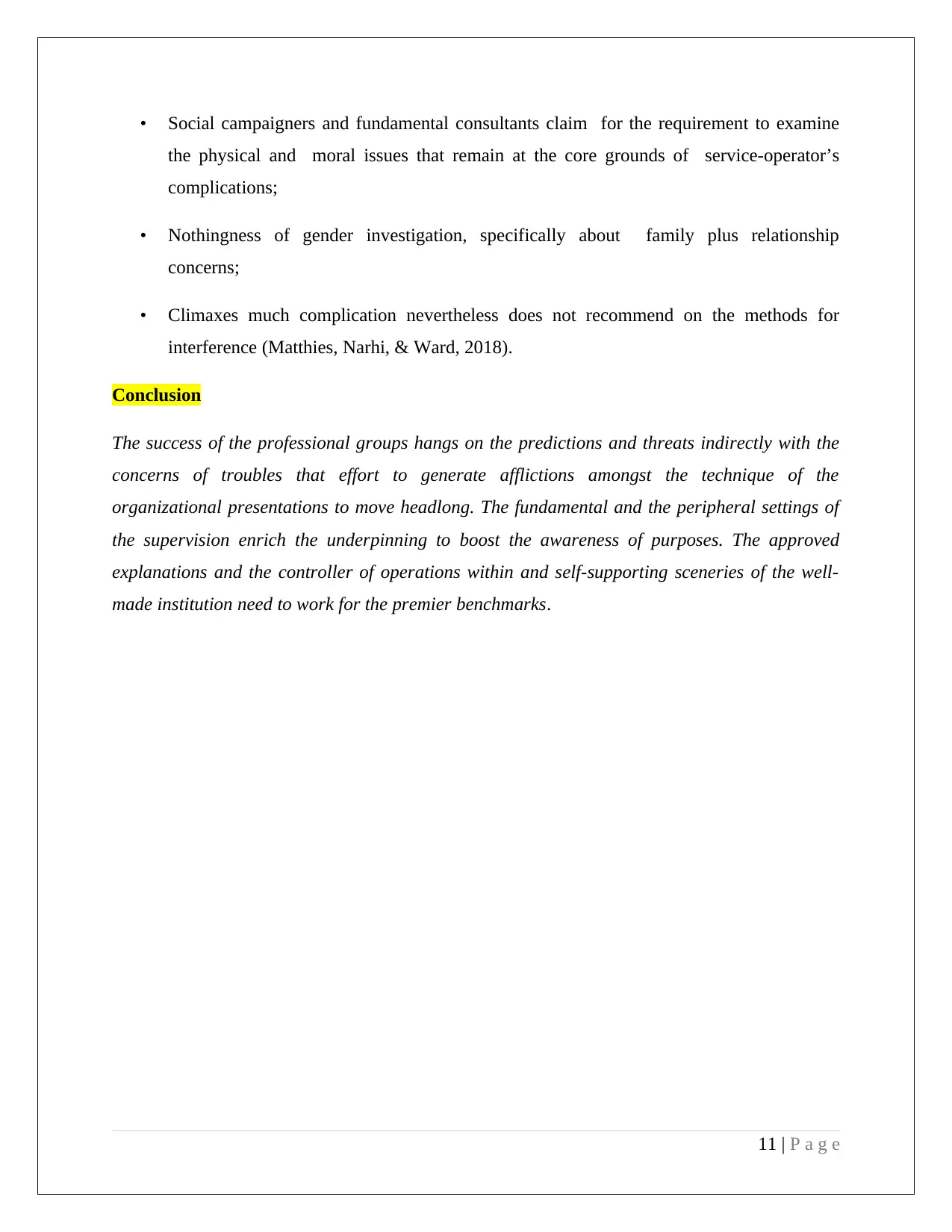
• Social campaigners and fundamental consultants claim for the requirement to examine
the physical and moral issues that remain at the core grounds of service-operator’s
complications;
• Nothingness of gender investigation, specifically about family plus relationship
concerns;
• Climaxes much complication nevertheless does not recommend on the methods for
interference (Matthies, Narhi, & Ward, 2018).
Conclusion
The success of the professional groups hangs on the predictions and threats indirectly with the
concerns of troubles that effort to generate afflictions amongst the technique of the
organizational presentations to move headlong. The fundamental and the peripheral settings of
the supervision enrich the underpinning to boost the awareness of purposes. The approved
explanations and the controller of operations within and self-supporting sceneries of the well-
made institution need to work for the premier benchmarks.
11 | P a g e
the physical and moral issues that remain at the core grounds of service-operator’s
complications;
• Nothingness of gender investigation, specifically about family plus relationship
concerns;
• Climaxes much complication nevertheless does not recommend on the methods for
interference (Matthies, Narhi, & Ward, 2018).
Conclusion
The success of the professional groups hangs on the predictions and threats indirectly with the
concerns of troubles that effort to generate afflictions amongst the technique of the
organizational presentations to move headlong. The fundamental and the peripheral settings of
the supervision enrich the underpinning to boost the awareness of purposes. The approved
explanations and the controller of operations within and self-supporting sceneries of the well-
made institution need to work for the premier benchmarks.
11 | P a g e
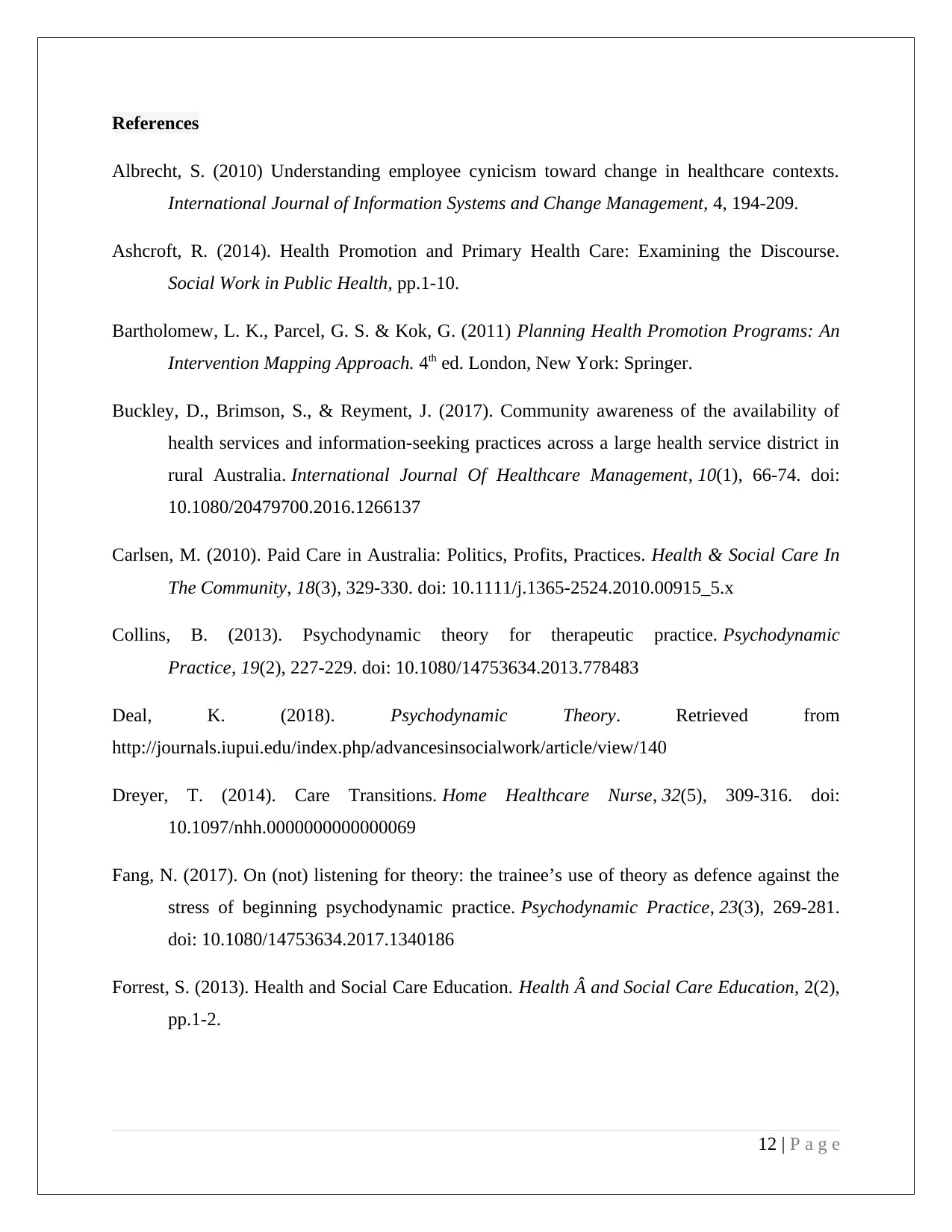
References
Albrecht, S. (2010) Understanding employee cynicism toward change in healthcare contexts.
International Journal of Information Systems and Change Management, 4, 194-209.
Ashcroft, R. (2014). Health Promotion and Primary Health Care: Examining the Discourse.
Social Work in Public Health, pp.1-10.
Bartholomew, L. K., Parcel, G. S. & Kok, G. (2011) Planning Health Promotion Programs: An
Intervention Mapping Approach. 4th ed. London, New York: Springer.
Buckley, D., Brimson, S., & Reyment, J. (2017). Community awareness of the availability of
health services and information-seeking practices across a large health service district in
rural Australia. International Journal Of Healthcare Management, 10(1), 66-74. doi:
10.1080/20479700.2016.1266137
Carlsen, M. (2010). Paid Care in Australia: Politics, Profits, Practices. Health & Social Care In
The Community, 18(3), 329-330. doi: 10.1111/j.1365-2524.2010.00915_5.x
Collins, B. (2013). Psychodynamic theory for therapeutic practice. Psychodynamic
Practice, 19(2), 227-229. doi: 10.1080/14753634.2013.778483
Deal, K. (2018). Psychodynamic Theory. Retrieved from
http://journals.iupui.edu/index.php/advancesinsocialwork/article/view/140
Dreyer, T. (2014). Care Transitions. Home Healthcare Nurse, 32(5), 309-316. doi:
10.1097/nhh.0000000000000069
Fang, N. (2017). On (not) listening for theory: the trainee’s use of theory as defence against the
stress of beginning psychodynamic practice. Psychodynamic Practice, 23(3), 269-281.
doi: 10.1080/14753634.2017.1340186
Forrest, S. (2013). Health and Social Care Education. Health  and Social Care Education, 2(2),
pp.1-2.
12 | P a g e
Albrecht, S. (2010) Understanding employee cynicism toward change in healthcare contexts.
International Journal of Information Systems and Change Management, 4, 194-209.
Ashcroft, R. (2014). Health Promotion and Primary Health Care: Examining the Discourse.
Social Work in Public Health, pp.1-10.
Bartholomew, L. K., Parcel, G. S. & Kok, G. (2011) Planning Health Promotion Programs: An
Intervention Mapping Approach. 4th ed. London, New York: Springer.
Buckley, D., Brimson, S., & Reyment, J. (2017). Community awareness of the availability of
health services and information-seeking practices across a large health service district in
rural Australia. International Journal Of Healthcare Management, 10(1), 66-74. doi:
10.1080/20479700.2016.1266137
Carlsen, M. (2010). Paid Care in Australia: Politics, Profits, Practices. Health & Social Care In
The Community, 18(3), 329-330. doi: 10.1111/j.1365-2524.2010.00915_5.x
Collins, B. (2013). Psychodynamic theory for therapeutic practice. Psychodynamic
Practice, 19(2), 227-229. doi: 10.1080/14753634.2013.778483
Deal, K. (2018). Psychodynamic Theory. Retrieved from
http://journals.iupui.edu/index.php/advancesinsocialwork/article/view/140
Dreyer, T. (2014). Care Transitions. Home Healthcare Nurse, 32(5), 309-316. doi:
10.1097/nhh.0000000000000069
Fang, N. (2017). On (not) listening for theory: the trainee’s use of theory as defence against the
stress of beginning psychodynamic practice. Psychodynamic Practice, 23(3), 269-281.
doi: 10.1080/14753634.2017.1340186
Forrest, S. (2013). Health and Social Care Education. Health  and Social Care Education, 2(2),
pp.1-2.
12 | P a g e
⊘ This is a preview!⊘
Do you want full access?
Subscribe today to unlock all pages.

Trusted by 1+ million students worldwide
1 out of 15
Related Documents
Your All-in-One AI-Powered Toolkit for Academic Success.
+13062052269
info@desklib.com
Available 24*7 on WhatsApp / Email
![[object Object]](/_next/static/media/star-bottom.7253800d.svg)
Unlock your academic potential
Copyright © 2020–2026 A2Z Services. All Rights Reserved. Developed and managed by ZUCOL.





